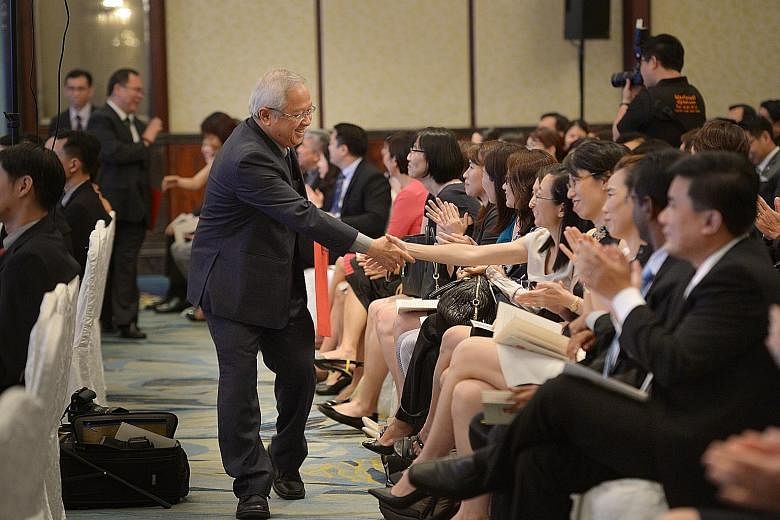Every Tuesday morning, for one hour and 20 minutes, students at Tanjong Katong Girls' School can choose what they want to do.
They can spend the time, for instance, on rehearsals, projects or peer conversations, with teachers urged not to intervene.
This was cited by Minister for Education (Schools) Ng Chee Meng yesterday as an example of how schools can set aside time and space for students to explore and to pursue their interests.
Such exploration can help to spark students' imagination and help them foster an "innovation quotient", he said.
Speaking at the 20th Appointment and Appreciation Ceremony for Principals at Shangri-La Hotel, Mr Ng stressed how pivotal innovation is to Singapore's growth.
In an age of disruption, technology had changed the world through Uber, Grab, Airbnb and the bitcoin craze, he said. And while such innovation would leave some floundering, it also presented tremendous opportunities, he said.
"So, Singapore needs to innovate. And schools are natural starting points to sow the seeds of innovation," said Mr Ng.
He stressed that innovation is not about a single moment that happens magically, but an ongoing process of intentional exploration.
"We need to be intentional about it because innovation requires certain skills and dispositions, hard work and perseverance," he said.
He said an environment enabling innovation can be created in schools by nurturing what he called the 3Is - imagination, inquisitiveness and interconnections.
On imagination, Mr Ng said: "In our schools, I think we can free up some space to embrace some messiness and uncertainty of outcomes, as perfect structure and order can impede innovation."
And while computers can give answers, they cannot ask questions, which is why one needed to foster inquisitiveness in students, he said.
They should also be encouraged to join the dots and make rich, deep and unexpected interconnections.
"Much innovation happens at the borders of established fields, when unexpected skills collide," he added.
Mr Ng said schools should use applied learning to allow students to appreciate the relevance of what they are learning. "Gone are the days where most of them will sit quietly in class, paying attention, trying to absorb whatever the teacher teaches them," he said.
At Queensway Secondary School, he noted, students built a sea perch and water quality sensor to collect and investigate the water, under an Applied Learning Programme in Environmental Science Education.
He also said teachers can foster lifelong learning in students by letting them experience the joy of learning.
Meanwhile, 63 principals received their appointment letters, while 16 retiring principals were applauded for their contributions to the education service.
Minister for Education (Schools) Ng Chee Meng's 3Is
1) Imagination
A child's imagination is a wealth of ideas and innovations. This contributes to creativity, flexible thinking and endless inspiration extending into adulthood. It requires time for personal reflection and free play through tasks that the children are personally interested in.
Example: Shigeru Miyamoto, creator of "Super Mario", spent long days exploring the mountains, valleys and hills, and spent time making his own toys. This inspired creative storylines, lovable characters and fantastical worlds in his games.
2) Inquisitiveness
Creative people are inquisitive enough to identify problems, and then persistently explore them until they come up with new solutions. Children should be encouraged to be curious and always ask "why" and "why not", instead of losing that spark as they grow older and learn that answers are more important than questions.
Example: Bukit Timah Primary uses Thinking Routines to support inquiry-based learning. For example, students get to ask questions and explain their thinking in ways such as drawing, in all their subjects.
3) Interconnections
According to neuroscience, innovation draws on the whole brain. School curriculum should drive students to "join the dots" and make rich, deep and unexpected links between the different things they learn. Much innovation happens when unexpected skills collide across different fields.
Example: At Anderson Primary School, upper primary students spend an hour each week exploring interconnections between the arts and sciences. For example, students learn about energy conversions through ceramic art.



